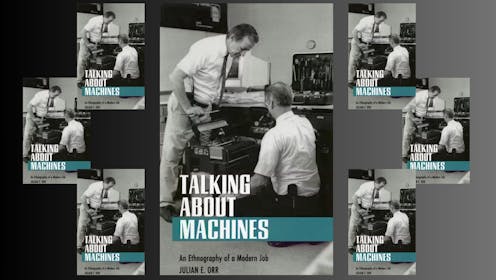Talking About Machines by Julian E. Orr
- Written by Wojciech Kwiatkowski, Lecturer in Business and Management, School of Business and Creative Industries, University of the West of Scotland

In 1969, Austrian-American writer Peter Drucker foretold a major societal and economic shift driven by knowledge. However, it would not be until the 1990s that scholars, managers, management consultants and policy-makers would herald the arrival of the knowledge economy[1], whereby goods and services depend not just on labour but on competencies, skills and ideas. As knowledge became recognised as the most valuable organisational and economic resource, the urge to manage it followed.
Management scholars, consultants and managers alike were quick to identify the main challenge of knowledge management. As long as knowledge resided in individual minds, it was hard for managers to control.
This shaped the agenda of knowledge management, which relied extensively on codification or otherwise capturing knowledge into a written or storeable form like a manual or guide that could then be managed.
To the knowledge manager, the fact “we can know more than we can tell” (as Hungarian-British polymath Michael Polanyi put it in 1966) is not particularly problematic. All that needs to be extrapolated from the individual mind is the set of general rules and procedures that allow a person to get a job done.
When Julian E. Orr’s book Talking about Machines: An Ethnography of a Modern Job[2] was published in 1996, it provided an important new perspective – a worker-centric alternative to the manager-focussed view of knowledge that until that point had been gaining a foothold in academia and in practice. It achieved this by launching a two-pronged assault on the central tenets of knowledge management.
Firstly, it exposed the limited usefulness of things such as manuals, instructions, guides or procedures in enabling competent action.
Secondly, and more fundamentally, it demonstrated that managers are often too dissociated from the work they manage to grasp the knowledge that is needed to work competently. Orr documented the experiences of Xerox photocopier technicians to demonstrate how the knowledge that allowed them to do their jobs well is not found in the service manuals they were provided with.
What made this assault particularly effective was Orr’s own background. His research experience as an anthropologist, his prior technician training in the army, and his own employment at Xerox, enabled him to describe the work of service technicians in vivid detail, often in the language the workers themselves use.
On the surface, the book depicted the failure of the manual that Xerox service technicians were expected to use when they fixed photocopiers. Some of the prescribed procedures simply did not work. The ones that did resolved problems that were so routine to technicians that there was no need for them to consult the manual.
Having said that, the manual did have some utility, even though the technicians denied it any credibility. They can be useful when technicians do not know where to start but become worthless as soon as they understand the state of the machine they are facing. The reason for this is that they do not contain the knowledge needed to get the job done.
Instead, this knowledge circulates informally within the technician community, alongside knowledge of what spare parts might come in handy, which management also sought to control via personal inventory restrictions.







